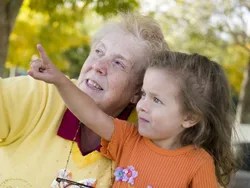Westchester families have a brand-new resource to help deal with the issues of autism. Last month saw the grand opening of The Autism Family Center, a program of the Westchester Jewish Community Services.

The Center brings together, under one roof, a variety of services for those with an autistic spectrum disorder and their families. It is intended, explains program director Patricia L. Grossman, L.C.S.W., to be “a place where a child can receive the critical skills training to allow him or her to function more successfully in the family and in the community.
“Families whose child may just have been diagnosed or who is somewhere along the journey can meet with other parents, receive support and information, and participate in support groups,” Grossman continues. “The groups are not only for parents but also for grandparents, siblings and extended family, building an extended social and emotional community as they face the challenges of living with a spectrum disorder.”
Autism is a neurobiological disorder of the brain that limits a person’s ability to communicate with others. But functioning can range from extremely high (where, though a child seems not to socialize well, she is highly successful academically and even professionally), to extremely low (where she is unable to relate with others at all). People with autism often have difficulty forming social relationships and may appear to be in their own worlds. A child with a spectrum disorder may have a classic diagnosis that fits precisely within one of the five Pervasive Developmental Disabilities (PDDs), or may be “somewhere on the spectrum” with bits and pieces from some or all of the specific PDDs. That “something is not quite right” is usually clear to parents or observant medical professionals by age 3. The key to diagnosing a PDD is the social disturbances the child may be exhibiting, such as difficulty looking people in the eye or failing to learn social skills as other children do.
The Family Autism Center offers small social skills groups for ages 7-16, with each group including at least three trained staff. If, during any group, a child becomes over-stimulated, a staff member can take him out to a quiet place to practice calming skills. The groups operate on a 12-week cycle curriculum, and each module focuses on another important component of social skills. Part of every session is free play, in which children are paired to play a game; the culmination is a play date. All activities and work done during a module focus on that one skill (emotional regulation, for example, or how to play with others, or non-verbal communication), and have a community component to teach the children how to generalize the skills outside of the agency and use them at home and in the community. The goal is to teach skills that have practical applications for the entire family, because the entire family is affected by autism.
As examples of what success looks like for a family coping with autism, Grossman relates two stories. The first is about a boy who was taught the social skill of asking family members how their day was — while looking them in the eye; he learned the skill very well and asked his mother the question at 7:30 in the morning (before, of course, she had really started her day!). In the second, another mother recently called the center to report that she was able to take her family out to dinner and sit through an entire meal; until that time, she had never been able to eat in a restaurant without her child having a meltdown.
In addition to its regular groups, the Center was selected by the Seaver Center of Mount Sinai Hospital to participate in a program where psychologists come every week to the youngest group with materials to enhance the existing curriculum.
The Center also conducts support groups and programs for families. Staff is available during the children’s groups for parents and grandparents who may need to talk, and there are monthly recreational programs for the entire family that include dinner and activities for everyone. There are drop-in days three times a week when anyone can stop in for coffee, meet with other families or a care manager, peruse the library and talk informally. The Center offers a monthly speaker series and is planning a system of trained parent mentors to provide 1:1 support so that there is always someone available on the other end of a telephone line for parents who need extra support, can’t reach a professional or simply want to speak privately.
Grossman concludes by paraphrasing Emily Perl Kingsley, the writer known for her 1987 poem, Welcome to Holland, about raising a child with a disability, and for her work to educate the public about disability rights: “You may not have the child you expected, but you have a wonderful opportunity with this child, and the world of disabilities doesn’t have to be a scary place. The goal of the Center is to enhance the family’s ability to cope with the challenges and struggles, to offer a community to receive support, to network, and share.”
The Autism Family Center is located at 845 North Broadway in White Plains. For more information, call (914) 761-0600 ext. 228, or visit www.wjcs.com.





















